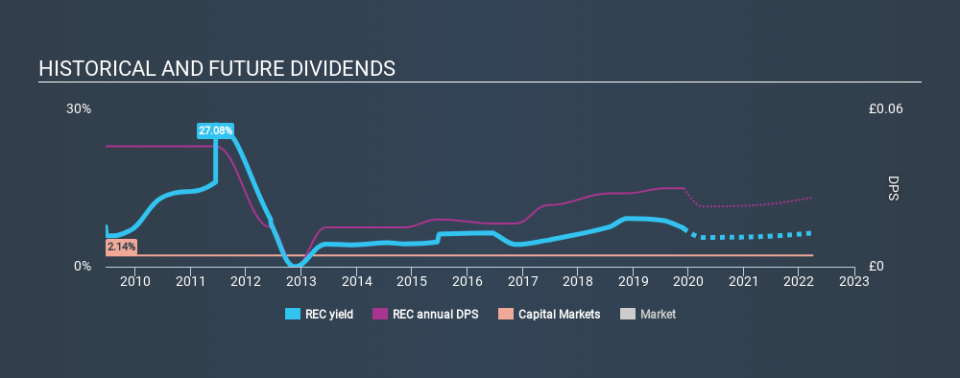Record plc (LON:REC) Goes Ex-Dividend In 2 Days

Readers hoping to buy Record plc (LON:REC) for its dividend will need to make their move shortly, as the stock is about to trade ex-dividend. Ex-dividend means that investors that purchase the stock on or after the 5th of December will not receive this dividend, which will be paid on the 27th of December.
Record's next dividend payment will be UK£0.011 per share, and in the last 12 months, the company paid a total of UK£0.03 per share. Based on the last year's worth of payments, Record stock has a trailing yield of around 7.3% on the current share price of £0.411. If you buy this business for its dividend, you should have an idea of whether Record's dividend is reliable and sustainable. So we need to check whether the dividend payments are covered, and if earnings are growing.
View our latest analysis for Record
If a company pays out more in dividends than it earned, then the dividend might become unsustainable - hardly an ideal situation. Its dividend payout ratio is 79% of profit, which means the company is paying out a majority of its earnings. The relatively limited profit reinvestment could slow the rate of future earnings growth We'd be worried about the risk of a drop in earnings.
Generally speaking, the lower a company's payout ratios, the more resilient its dividend usually is.
Click here to see the company's payout ratio, plus analyst estimates of its future dividends.
Have Earnings And Dividends Been Growing?
Stocks in companies that generate sustainable earnings growth often make the best dividend prospects, as it is easier to lift the dividend when earnings are rising. If earnings decline and the company is forced to cut its dividend, investors could watch the value of their investment go up in smoke. With that in mind, we're encouraged by the steady growth at Record, with earnings per share up 3.3% on average over the last five years.
Another key way to measure a company's dividend prospects is by measuring its historical rate of dividend growth. Record's dividend payments per share have declined at 4.2% per year on average over the past ten years, which is uninspiring. Record is a rare case where dividends have been decreasing at the same time as earnings per share have been improving. It's unusual to see, and could point to unstable conditions in the core business, or more rarely an intensified focus on reinvesting profits.
The Bottom Line
Has Record got what it takes to maintain its dividend payments? Record has been generating some growth in earnings per share while paying out more than half of its earnings to shareholders in the form of dividends. We're unconvinced on the company's merits, and think there might be better opportunities out there.
Curious what other investors think of Record? See what analysts are forecasting, with this visualisation of its historical and future estimated earnings and cash flow.
A common investment mistake is buying the first interesting stock you see. Here you can find a list of promising dividend stocks with a greater than 2% yield and an upcoming dividend.
If you spot an error that warrants correction, please contact the editor at editorial-team@simplywallst.com. This article by Simply Wall St is general in nature. It does not constitute a recommendation to buy or sell any stock, and does not take account of your objectives, or your financial situation. Simply Wall St has no position in the stocks mentioned.
We aim to bring you long-term focused research analysis driven by fundamental data. Note that our analysis may not factor in the latest price-sensitive company announcements or qualitative material. Thank you for reading.

 Yahoo Finance
Yahoo Finance 
